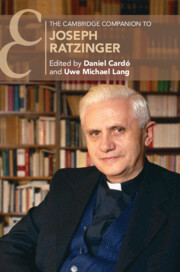Refine search
Actions for selected content:
114 results
15 - Grace
- from Part II - Theological Themes
-
-
- Book:
- The Origins of Scholasticism
- Published online:
- 18 November 2025
- Print publication:
- 08 January 2026, pp 413-436
-
- Chapter
- Export citation
Church-Building and the Consolidation of the United States, 1865–1900
-
- Journal:
- Church History / Volume 94 / Issue 2 / June 2025
- Published online by Cambridge University Press:
- 27 August 2025, pp. 296-320
- Print publication:
- June 2025
-
- Article
-
- You have access
- Open access
- HTML
- Export citation
1 - Handicrafts
-
- Book:
- Fair Trade
- Published online:
- 01 May 2025
- Print publication:
- 15 May 2025, pp 19-42
-
- Chapter
- Export citation
24 - Papal Patronage and the Arts: From the Early Christian Period to the Twentieth Century
- from Part IV - Education, Culture, Arts
-
-
- Book:
- The Cambridge History of the Papacy
- Published online:
- 28 February 2025
- Print publication:
- 20 March 2025, pp 681-702
-
- Chapter
- Export citation
Epilogue: New Explorations on Food, Society, and Culture in Vietnam
-
- Journal:
- Asia-Pacific Journal / Volume 22 / Issue 2 / February 2024
- Published online by Cambridge University Press:
- 14 March 2025, e8
-
- Article
-
- You have access
- Open access
- Export citation
Keeping Alight the Kitchen Fire: Food Charity and Communal Solidarity in Ho Chi Minh City (Vietnam)
-
- Journal:
- Asia-Pacific Journal / Volume 22 / Issue 2 / February 2024
- Published online by Cambridge University Press:
- 14 March 2025, e5
-
- Article
-
- You have access
- Open access
- Export citation
Dishonesty and charitable behavior
-
- Journal:
- Experimental Economics / Volume 17 / Issue 4 / December 2014
- Published online by Cambridge University Press:
- 14 March 2025, pp. 717-732
-
- Article
- Export citation
The Merit of Meat: Karma as Social Fact among Food Charities in Vietnam
-
- Journal:
- Asia-Pacific Journal / Volume 22 / Issue 2 / February 2024
- Published online by Cambridge University Press:
- 14 March 2025, e7
-
- Article
-
- You have access
- Open access
- Export citation
Introduction to the Special Issue: Food Charity, Religion, and Care in Vietnam
-
- Journal:
- Asia-Pacific Journal / Volume 22 / Issue 2 / February 2024
- Published online by Cambridge University Press:
- 14 March 2025, e4
-
- Article
-
- You have access
- Open access
- Export citation
Subliminal influence on generosity
-
- Journal:
- Experimental Economics / Volume 20 / Issue 3 / September 2017
- Published online by Cambridge University Press:
- 14 March 2025, pp. 531-555
-
- Article
- Export citation
Fair weather avoidance: unpacking the costs and benefits of “Avoiding the Ask”
-
- Journal:
- Journal of the Economic Science Association / Volume 1 / Issue 1 / July 2015
- Published online by Cambridge University Press:
- 17 January 2025, pp. 8-14
-
- Article
- Export citation
Chapter 17 - Zakat and Waqf: Towards Achieving Sustainability, Health, and Well-Being
-
-
- Book:
- Contemporary Islamic Perspectives in Public Health
- Published online:
- 02 January 2025
- Print publication:
- 16 January 2025, pp 106-111
-
- Chapter
- Export citation
2 - Islamic Norms, Interpretations, Applications
-
- Book:
- Refining the Common Good
- Published online:
- 08 November 2024
- Print publication:
- 21 November 2024, pp 30-46
-
- Chapter
- Export citation
Key Factors Influencing Public Attitudes Toward Charities’ Involvement in Emergency Management: A Study Based on Online Public Opinion in China
-
- Journal:
- Disaster Medicine and Public Health Preparedness / Volume 18 / 2024
- Published online by Cambridge University Press:
- 28 October 2024, e205
-
- Article
- Export citation
Utrum sit una tantum vera enumeratio virtutum moralium (Whether There Is a Single Correct List of the Virtues of Character)
-
- Journal:
- New Blackfriars / Volume 105 / Issue 5 / September 2024
- Published online by Cambridge University Press:
- 23 September 2024, pp. 471-477
- Print publication:
- September 2024
-
- Article
-
- You have access
- Open access
- HTML
- Export citation
6 - Compassionate Experience
-
- Book:
- Ways of Living Religion
- Published online:
- 07 March 2024
- Print publication:
- 14 March 2024, pp 225-268
-
- Chapter
- Export citation

The Cambridge Companion to Joseph Ratzinger
-
- Published online:
- 25 January 2024
- Print publication:
- 21 December 2023
Pathways to the medieval hospital: collective osteobiographies of poverty and charity
- Part of
-
- Article
-
- You have access
- Open access
- HTML
- Export citation
2 - Political Virtues?
-
- Book:
- Augustine on the Nature of Virtue and Sin
- Published online:
- 10 January 2024
- Print publication:
- 23 November 2023, pp 45-81
-
- Chapter
- Export citation
Providence, Divine Causality, and the Gratuitousness of Love: A Thomist Perspective
-
- Journal:
- New Blackfriars / Volume 104 / Issue 1114 / November 2023
- Published online by Cambridge University Press:
- 01 January 2024, pp. 796-817
- Print publication:
- November 2023
-
- Article
-
- You have access
- Open access
- HTML
- Export citation
